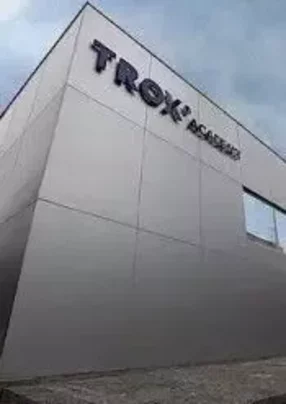
Trox do Brasil
Since the beginning of its operations in the Brazilian market, Trox do Brazil stand out by its innovative culture. This characteristic was maintained throughout the nearly four decades of operation in the country.
Founded in 1975, effectively starting its activities in 1976, the Brazilian unit is part of the Trox Group, which is headquartered in Germany and has always focused its activities in manufacturing components for central air conditioning systems. “Today, we have a total of 15 plants worldwide, and in South America, Trox has units in Brazil and Argentina," reveals Arnaldo Basile, Managing Director of the company in the country.
However, Trox do Brasil is the largest subsidiary of the Trox Group outside Germany: “We have some prominence in the group because of this - the unit in Brazil is the largest in production and sales, representing about 12 percent of the Group revenues," reveals Basile.
Trox is known as a leader, both in Brazil and internationally, in the product lines of grilles and air vents in aluminum and steel, laminar flow cabinets, sound and noise attenuators, acoustic hoods, air filters, dampers firebreak, air flow records; air handling units; airtight doors and everything else that relates to the distribution and control of air diffusion in a large facility.
With a vast portfolio, the concern with product development is a highlight. “We value the quality and functionality of our components. We are suppliers of Petrobras, Electronuclear and, to have this qualification, our products are rigorously evaluated. We specialize for this customer requirements standards, which demands a need for resources, and a much more refined development, " says Basile, adding: "Two years ago, we installed a laboratory for product development, in our factory in Curitiba, working online with laboratories in Germany and England, and every product we develop, we can put parameters to be evaluated simultaneously by any laboratory.”
INDEPENDENCE AND COOPERATION
"Train, enable and recycle our staff is of paramount importance," says Basile. To achieve this goal, Trox do Brasil remains a very strong connection with the Brazilian Association of Refrigeration, Air Conditioning, Ventilation and Heating (Abrava): "We have an agreement in São Paulo, in the commercial area, which includes sales, technical assistance and logistics, on which manage some courses. We offer our technicians and managers time in the development of society, professionals that the market needs," says Basile, adding: "In addition, we are also associated with the German Chamber of São Paulo and Paraná and have access to train and empower our people through these institutions, but also with the Brazilian Society for Contamination Control (SBCC) where, besides training our staff, we also minister courses where we have expertise."
Despite combine research resources of all poles from the Trox Group’s, its subsidiaries have autonomy to develop all the products that they deem appropriate and necessary to its markets. “All branches have autonomy to develop any product that is related to our core business, independently or with the aid of Trox Germany. Then we can develop products here in Brazil, with reference to the principles, dimensional parameters, quality, operability that are developed in Germany, or we can ask for them to develop something for us, and we develop together. We have a very large degree of independence," Basile details.
Trox is also known in Brazil for its expertise in a line of products that involve the concept of air conditioning called Fan Coil or Air Handling Units machines, used in more sophisticated facilities, such as laboratories, hospitals and clean rooms . “We have a specialty and a very significant recognition within the Brazilian market. In this aspect we are market leaders, for special applications with such equipment," says Basile.
Innovation has always been a tradition in the company, and the last major technological innovation that Trox brought to Brazil was the concept of cold beams, which began to be presented to the Brazilian market about eight years ago and that some companies have adopted four years ago. “Trox began developing the concept of cold beams - equivalent to the UTA-, but where cold beam is installed on the roof of a property, where there pipes pass chilled water, which climaxes the environment itself by heat exchange with the environment. This concept of cold beam is a concept that uses no fan and uses no engine, basically using the physical principle that hot air rises and naturally creates this natural cycle, without the use of motors and fans," says Basile.
Trox was the first to develop and use this concept. The whole system ends up saving energy when in operation. “We have some construction operation that will use the concept in Rio de Janeiro, Recife, Salvador and elsewhere. The initial installation cost is equivalent, but the operating cost, either the consumption of electricity, the cost of maintenance, and spare parts, is 25-30 percent cheaper than the conventional system," Basile accounts.

